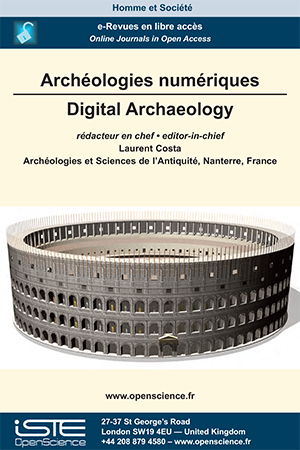

Social Sciences and Humanities > Home > Digital Archaeology > Issue
Archaeological prospection includes various and complementary methods. Among them geophysical ones
aims at recording spatial variations of underground physical properties using a well sampled grid layout. Some examples
are referred.
This article deals with the issue of sampling in archaeological survey, and particularly in preventive
archaeology. After recalling the origins of sampling in archaeology since the 1960s, and the work of French
archaeologists in this area in the 1970s, the method of prospecting used by INRAP, based on the survey by transects dug
by excavator, is studied and its effectiveness criticized. Improvements are given. Then, it is proposed to distinguish for
preventive archaeology between the archaeological prospecting on a large scale that occurs upstream with nondestructive
techniques, and prospecting for diagnosis that is performed generally after the land acquisition phase. It is
then shown that the two surveys are essential and complementary, the first allowing to enrich the application of the
second. A general methodology for specifying a prospecting plan is then set using the many techniques of surveys
available at best. Some of these techniques have recently experienced significant improvements in terms of reliability and
productivity which increase deeply the effectiveness of a prospecting plan. Finally, the political component of the current
method of the INRAP is mentioned, and it is proposed to separate the scientific treatment of the subject that concerns the
definition of the method from its social treatment that includes the business organization of its implementation in France.
Scale is the key concept when dealing about survey and particularly for the geophysical survey over large
areas. At first, the role of geophysics in rescue archaeology is described. After noticing the known role of geophysics in
academic archaeology, we analyze the arguments given for its scarce use in preventive archaeology and in particular for
large development projects in France. Secondly, a European perspective is made. Finally, a history of several
experiences undertaken in France since 1995 is raised.
The paper discusses both theory and practice in the application of the Italian domestic law, which
has applied since 2006 to any kind of public new construction or to the modification of existing structures. The
author argues, based on two of his own projects, BREBEMI and EMPTYSCAPES, that there are both shortcomings
and new opportunities within Planning Led Archaeology. Projects from the last decade, in Italy and elsewhere,
have demonstrated the potential effectiveness of new approaches to pre-development evaluation in the operation
of the current legal and scientific framework that may make it possible to overcome some severe limitations in
current practice.

2020
Volume 20- 4
Issue 12019
Volume 19- 3
Issue 1 Proceedings of the session n° III-3 (CA) of the XVIII° UISPP congress, Paris, June 2018 Session III-3 (CA). Construire des référentiels partagés : Webmapping et archéologie.2018
Volume 18- 2
Issue 12017
Volume 17- 1
Issue 1